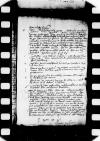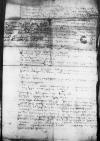Letter #727
Cornelis DE SCHEPPER to Ioannes DANTISCUSChambéry, 1531-12-16
English register:
De Schepper has spent a few days in Chambéry, where he has held discussions with the Duke of Savoy [Charles III]. He found the Duchess [Beatrice of Portugal] quite civilised.
The outcome of the case [the armed conflict between the Swiss Protestant and Roman Catholic cantons] was as expected. After the double defeat the people of Zürich have forced the magistrates to conduct peace negotiations.
De Schepper gives a summary of the peace treaty between the five Catholic cantons and Zürich that was concluded on 16 November 1531. The five cantons were initially reluctant to conclude peace with Bern. Eventually a treaty was concluded on 24 November in the presence of the ambassadors of France, Savoy, Ernst Margrave of Baden, the Duchess of Longueville [Jeanne de Hochberg] and the three cantons that had remained neutral. The conditions are largely the same as those for Zürich. The differences are listed by De Schepper.
On 4 December there was an uprising of the common people in Bern, in which additional demands were made. As the turmoil continues, it is believed that peace will not last.
De Schepper will travel to Milan, and then return to the Emperor [Charles V]. He gives instructions on forwarding their correspondence.
| received Brussels, [1531]-12-30 Manuscript sources:
Auxiliary sources:
Prints:
| ||||||||||||||||||
Text & apparatus & commentaryPlain textText & commentaryText & apparatus
Reverendissimo in Christo Patri et Domino, domino
Salutem plurimam.
Tandem incolumis perveni
1. Quinque cantones et ipsorum confoederati, scilicet
2. Utraque pars fruetur antiquis privilegiis et dominiis ab olim habitis.
(Qui est magnus articulus, nam
Sed si qui sunt utrimque, qui volunt vivere in nova fide aut in veteri, permittantur illaesi. Bona ecclesiarum non tam praedicantibus, quam aliis sacerdotibus dividentur. Nemini probro erit sic vel sic credidisse.
3. Servabitur antiquum compromissum initum inter cantones a maioribus ipsorum, dum primo se vindicarunt in libertatem,
(id quod
et non poterint
Per hunc articulum excluditur omnis susceptio in tutelam vicinorum oppidorum, quam
4. Omnes contractus cum aliis principibus initos
5. Duo milia quingentos scutos auri receptos a
6. In actionibus iuris stetur compromisso veteri. Si quis recuset, tenebuntur alii cantones eum, qui ius petit, manutenere et defendere corpore et bonis, prout maiores ipsorum facere sunt soliti.
7. Restituetur utrimque, quod ante initium belli ademptum est. Si non potest, recompensabitur.
8. Captivi liberabuntur utrimque. Si plures sunt
Actum die Othmari[9] anno XV-c XXXI. Signatum sigillo oppidi
Haec cum
Cuius quidem pacis condiciones primae eaedem sunt, sicut cum
5.
8. Promiserant
9. Quidam pagi sub dominio
10. Das
11. Captivi liberabuntur utrimque gratis. Cessabit omnis recordatio malorum, ut cum
Actum vigilia Catharinae.[13] Signatum sigillo oppidi
His cum
1. Causa fidei nemo deiciatur magistratu, nullus admittatur sine scitu vulgi. Nemo extraneus sit de consilio vel habeat officium castellaniae.
2. Castellani bonorum ecclesiasticorum sint eorum, qui habitant in locis, ubi bona sunt.
3.
4. Ex quo adempta sunt bona ecclesiis, remittatur populo census et non solvat, nisi decimas.
5.
6. Unusquisque libere possit audire missam, confiteri et uti sua conscientia sine molestatione
Ad ista nihil responsum adhuc est, adeo ut tumultus sit magnus, et creditur pax rata non futura. Ego ibo
Commenda me omnibus et tibi praesertim, et vale rectissime.
Ex
Eiusdem Reverendissimae Dominationis Vestrae humilis inservitor Cornelius
[1 ] Allobrogum; the territory of the Celtic tribe of the Allobroges roughly corresponds to later Savoy
[2 ] geminam cladem: the Battle of Kappel and the Battle on the Gubel, in the Second War of Kappel (Zweiter Kappelerkrieg), fought in 1531 between the Protestant and the Catholic Swiss cantons. In the Battle of Kappel (11 October 1531), the army of Zürich, led by Ulrich Zwingli, was defeated by the army of the Five Catholic Cantons. Zwingli himself died in this battle. After this defeat, the Zürich army was reinforced by troops from Bern and other Reformed cantons. They were defeated again by the Five Cantons in the battle on the Gubel hill (24 October, 1531) (cf. Helmut Meyer, "Kappelerkriege" w: Historisches Lexikon der Schweiz, http://www.hls-dhs-dss.ch/d/ ⌊MEYERcf. Helmut Meyer, "Kappelerkriege" w: Historisches Lexikon der Schweiz, http://www.hls-dhs-dss.ch/d/ ⌋)
[3 ] The Five Catholic Cantons: viz. Luzern, Uri, Schwyz, Unterwalden and Zug
[4 ] At the end of the Second War of Kappel the Zweiter Kappeler Landfrieden was concluded. This resulted in several peace treaties, of which the main treaty, between Zürich and the Five Catholic Cantons, was concluded in Deinikon near Baar on 16 November 1531. This treaty was sealed in its final form in the Charter of Zug on 20 November 1531, hence the two dates that are found in sources referring to this treaty. It was followed by the treaty of 24 November 1531 between Bern and the Five Cantons. This text, issued in Bremgarten, largely incorporates the conditions of the treaty with Zurich, but contains a number of different additional clauses. It was the basis of the peace treaties between the Five Cantons and Basel (1531-12-22) and Schaffhausen (1532-01-31). The Zweiter Kappeller Landfrieden governed the religious relations between the Catholic and Reformed cantons in the Swiss Confederacy (Eidgenossenschaft). Cf. cf. Religionsvergleiche des 16. Jahrhunderts I: Zweiter Kappeler Landfrieden 1531. Konfessionelle Vergleiche in den Landsgemeindeorten. Appenzell und Glarus. Augsburger Religionsfrieden 1555, wyd. Ernst Walder, Bern, Herbert Lang, 1974, seria: Quellen zur neueren Geschichte. Historisches Institut der Universität Bern Heft 7 , p. 4-5⌊cf. Religionsvergleiche des 16. Jahrhunderts I: Zweiter Kappeler Landfrieden 1531. Konfessionelle Vergleiche in den Landsgemeindeorten. Appenzell und Glarus. Augsburger Religionsfrieden 1555, wyd. Ernst Walder, Bern, Herbert Lang, 1974, seria: Quellen zur neueren Geschichte. Historisches Institut der Universität Bern Heft 7 , p. 4-5⌋
[6 ] Seduni; Celtic tribe, situated in Wallis/Valais, mentioned by Caesar (cf. Caius Iulius Caesar, De bello Gallico ⌊Caes. Gal.cf. Caius Iulius Caesar, De bello Gallico ⌋ 3.1.1, 3.1.4, 3.2.1, 3.7.1)
[7 ] Veragri; Celtic tribe, situated in Wallis/Valais, mentioned by Caesar (cf. Caius Iulius Caesar, De bello Gallico ⌊Caes. Gal.cf. Caius Iulius Caesar, De bello Gallico ⌋ 3.1.1, 3.1.4, 3.2.1, 3.7.1)
[9 ] 16 November
[11 ] 25 November
[10 ] German text of the Treaty between the Five Cantons and Zürich, see cf. Religionsvergleiche des 16. Jahrhunderts I: Zweiter Kappeler Landfrieden 1531. Konfessionelle Vergleiche in den Landsgemeindeorten. Appenzell und Glarus. Augsburger Religionsfrieden 1555, wyd. Ernst Walder, Bern, Herbert Lang, 1974, seria: Quellen zur neueren Geschichte. Historisches Institut der Universität Bern Heft 7 , p 5-13⌊Religionsvergleichecf. Religionsvergleiche des 16. Jahrhunderts I: Zweiter Kappeler Landfrieden 1531. Konfessionelle Vergleiche in den Landsgemeindeorten. Appenzell und Glarus. Augsburger Religionsfrieden 1555, wyd. Ernst Walder, Bern, Herbert Lang, 1974, seria: Quellen zur neueren Geschichte. Historisches Institut der Universität Bern Heft 7 , p 5-13⌋ and cf. Archiv für die schweizerische Reformations-Geschichte, wyd. Theodor Scherer-Boccard, t. 2, Freiburg im Breisgau, 1872 ⌊Archiv 1872cf. Archiv für die schweizerische Reformations-Geschichte, wyd. Theodor Scherer-Boccard, t. 2, Freiburg im Breisgau, 1872 ⌋, p. 372-376
[14 ] For the German text of the Treaty between the Five Cantons and Bern, see cf. Archiv für die schweizerische Reformations-Geschichte, wyd. Theodor Scherer-Boccard, t. 2, Freiburg im Breisgau, 1872 ⌊Archiv 1872cf. Archiv für die schweizerische Reformations-Geschichte, wyd. Theodor Scherer-Boccard, t. 2, Freiburg im Breisgau, 1872 ⌋, p. 386-393
[12 ] The text of the treaty reads „Hassle” (cf. cf. Archiv für die schweizerische Reformations-Geschichte, wyd. Theodor Scherer-Boccard, t. 2, Freiburg im Breisgau, 1872 ⌊Archiv 1872cf. Archiv für die schweizerische Reformations-Geschichte, wyd. Theodor Scherer-Boccard, t. 2, Freiburg im Breisgau, 1872 ⌋ (cf. Josef Brülisauer, "Oberhasli" w: Historisches Lexikon der Schweiz, http://www.hls-dhs-dss.ch/d/ ⌊BRÜLISAUERcf. Josef Brülisauer, "Oberhasli" w: Historisches Lexikon der Schweiz, http://www.hls-dhs-dss.ch/d/ ⌋; cf. Anne-Marie Dubler, "Meiringen" w: Historisches Lexikon der Schweiz, http://www.hls-dhs-dss.ch/d/ ⌊DUBLER Meiringencf. Anne-Marie Dubler, "Meiringen" w: Historisches Lexikon der Schweiz, http://www.hls-dhs-dss.ch/d/ ⌋; cf. Anne-Marie Dubler, "Hasliberg" w: Historisches Lexikon der Schweiz, http://www.hls-dhs-dss.ch/d/ ⌊DUBLER Haslibergcf. Anne-Marie Dubler, "Hasliberg" w: Historisches Lexikon der Schweiz, http://www.hls-dhs-dss.ch/d/ ⌋
[13 ] 24 November



